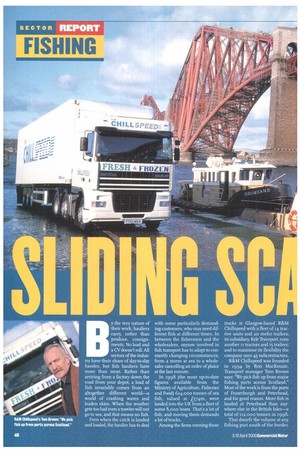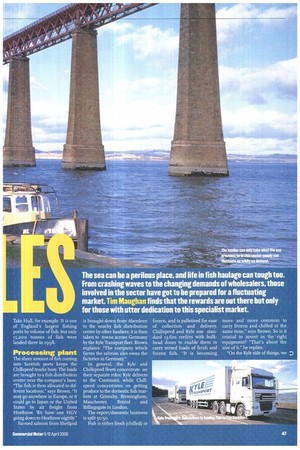y the very nature of their work, hauliers carry, rather
Page 48

Page 49

If you've noticed an error in this article please click here to report it so we can fix it.
than produce, consignments. No load and a CV doesn't roll. All sectors of the indus try have their share of day-to-day hassles, but fish hauliers have more than most. Rather than arriving from a factory down the road from your depot, a load of fish invariably comes from an altogether different world—a world of crashing waves and leaden skies. When the weather gets too bad even a trawler will not go to sea, and that means no fish.
_Even when the catch is landed and loaded, the haulier has to deal with some particularly demanding customers, who may need different fish at different times. In between the fishermen and the wholesalers, anyone involved in fish transport has to adapt to constantly changing circumstances, from a storm at sea to a wholesaler cancelling an order of plaice at the last minute.
In 1998 (the most up-to-date figures available from the Ministry of Agriculture, Fisheries and Food) 614,000 tonnes of sea fish, valued at f574m, were landed into the UK from a fleet of some 8,croo boats. That's a lot of fish, and moving them demands a lot of tucks.
Among the firms running those
trucks is Glasgow-based R&M Chillspeed with a fleet of 14 tractive units and 20 reefer trailers; its subsidiary. Kyle Transport, runs another II tractors and 15 trailers; and to maximise its flexibility the company uses 45 subcontractors.
R&M Chillspeed was founded in 1994 by Ron MacKenzie. Transport manager Tom Brown says: "We pick fish up from major fishing ports across Scotland." Most of the work is from the ports of Fraserburgh and Peterhead, and for good reason. More fish is landed at Peterhead than anywhere else in the British Isles—a total of 112,000 tonnes in 1998.
That dwarfs the volume at any fishing port south of the border. Take Hull, for example. It is one of England's largest fishing ports by volume of fish, but only 15.zo0 tonnes of fish were landed there in 1998.
Processing plant
The sheer amount offish coming into Scottish ports keeps the Chillspeed trucks busy. The loads are brought to a fish distribution centre near the company's base. "The fish is then allocated to different locations," says Brown. It may go anywhere in Europe, or it could go to Japan or the United States by air freight from Heathrow. We have one HGV going down to Heathrow nightly."
Farmed salmon from Shetland is brought down from Aberdeen to the nearby fish distribution centre by other hauliers; it is then taken to towns across Germany by the Kyle Transport fleet. Brown explains: "The company which farms the salmon also owns the factories in Germany."
In general, the Kyle and Chillspeed fleets concentrate on their separate roles: Kyle delivers to the Continent, while Chillspeed concentrates on getting produce to the domestic fish markets at Grimsby, Birmingham, Manchester, Bristol and Billingsgate in London.
The export/domestic business is split 5o:5o.
Fish is either fresh (chilled) or frozen, and is palletised for ease of collection and delivery. Chillspeed and Kyle use standard 13.6m reefers with bulkhead doors to enable them to carry mixed loads of fresh and frozen fish. "It is becoming more and more common to carry frozen and chilled at the same time," says Brown. So is it crucial to invest in the right equipment? "That's about the size of it," he replies.
"On the Kyle side of things, we




















































































































